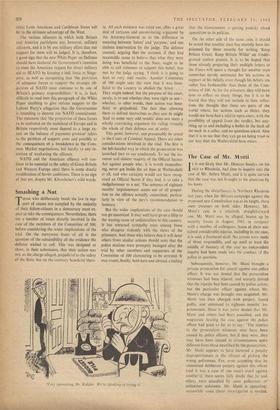STILL UNDER THREAT
MR. KHRUSIH III V believes in the use both of carrots and sticks in his dealings with the West. Russian intimidation in the Berlin air cor- ridors consorts ill with the conciliatory words of his recent letter to heads of government, but is part of the same policy of goading and cajoling Western leaders to a summit conference. No doubt Western governments are aware of this and are rightly suspicious of what they may find on the top of F6 when they get there. But they must also appear not less eager for negotiation than the Russians, since Mr. Khrushchev's diplo- macy is intended for Western public opinion and the uncommitted countries rather than the gov- ernments to which it is ostensibly addressed.
Unfortunately, there is no lack in Britain of asses responsive to the traditional methods of donkey-driving. And Mr. Khrushchev's task is made all the easier for him in that the Berlin issue can easily be associated with the bitter anti-Ger- man prejudice (anti-West German only, let it be noted) which at present disgraces so many public utterances in this country. This type of paranoiac bitterness is as ungenerous as it is unintelligent. Were it ever to influence the policies of the British Government, its only results would be to bring about that very resurgence of German national- ism which it purports to fear. Where it is com- bined with admiration for the achievements of Herr Ulbricht it is thoroughly dishonest, and frequently conceals unavowable motives.
Mr. Khrushchev can also count on the chauvinism of the British Left which dislikes co- operation with our NATO allies, and greatly overestimates the power and influence of Britain when isolated from them. The headline of last week's Tribune, `Don't Let Britain Play Second Fiddle,' shows how far the left wing of the Labour Party has come from its pristine inter- nationalism and has a strong resemblance to the slogans of Suez group or Beaverbrook press.
This wildly unrealistic view of the facts of
Britain's position today is possibly only held by a small minority which takes its wishes for horses. But it is a vocal minority, and its anti-German and anti-American outpourings do a certain amount of damage abroad as well as appealing to the smuggest side of our national complacency. Western Europe is still threatened by Russian military power and defended from that threat by an alliance of which the brunt is borne by the US. It is, therefore. natural that America should exer- cise the role of leadership within NATO, and, though this situation may yet change with a re- assertion of European power, it would be disas- trous for Britain to try to go it alone.
As for the Berlin question, there is no doubt that this is both difficult and dangerous, and among other reasons it is just because it places the West at a disadvantage that Mr. Khrushchev has raised it. But, .however much we may wish for a solution, we have the clearest obligation to fulfil our promises to the people of West Berlin, who have trusted us to defend them against the tyrannical Ulbright regime, and to the West Ger- man Government which is our ally—a point some commentators seem to overlook. On questions such as access to West Berlin absolute firmness is required. Havering will get us nowhere.
And the same conclusion might be applied to other areas of Anglo-American policy. Mr. Rostow's mission to Europe to mobilise NATO against Dr. Castro may on the face of it appear ill-advised. It has apparently led to sonic re- criminations concerning reciprocal support as be- tween allies. But it should be realised that it is just as much a Western European as an American interest to undermine a self-confessedly Com- munist regime in the Western hemisphere. The point which is in doubt is whether a blockade is the best way of doing it, and whether its effect on other Latin American and Caribbean States will be to the ultimate advantage of the West.
The various alliances in which both Britain and America participate are, however, military alliances, and it is by our military effort that our support for them will be judged. It is, therefore, .a good sign that the new White Paper on Defence should have declared the Government's intention to meet the American request for direct military aid to SEATO by keeping a task force at Singa- pore, as well as recognising that 'the provision of adequate forces to support the strategic ob- jectives of NATO must continue to be one of Britain's primary responsibilities.' It is, in fact,- difficult to read into this paragraph of the White Paper anything to give serious support to the Labour Party's allegation that the Government is intending to demote our NATO commitment. The statement that 'the proportion of these forces to be stationed on the mainland of Europe and in Britain respectively must depend to a large ex- tent on the balance of payments position' refers to the problem of support costs and possibly to the consequences of a breakdown in the Com- mon Market negotiations, but hardly to any in- tention of weakening the alliance.
NATO and the American alliance will con- tinue to be essential to the safety of Great Britain and Western Europe until there is some drastic modification of Soviet ambitions. There is no sign of that yet, despite Mr. Khrushchev's mild words.



































 Previous page
Previous page